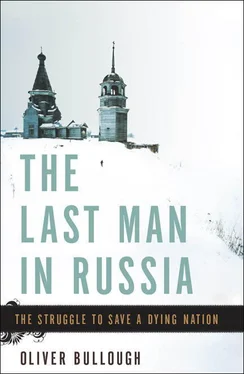Religion in Communist Lands (Volume 1, nos. 4–5; Volume 4, no. 2) contains accounts of his sermons.
Other writings are in:
Vestnik Russkogo Khristianskogo Dvizheniya (no. 118, 1976; no. 120, 1977)
Russkoe Vozrozhedenie (Russian Renaissance , no. 2, 1978; nos. 7–8, 1979)
Izvestia (21 June 1980)
Journal of the Moscow Patriarchate (no. 7, 1980)
Den (Day , including 21–7 June 1992; 15–21 November 1992; 1–9 January 1993; 7–13 February 1993; 23–29 May 1993; 1–7 October 1993)
Zavtra (Tomorrow , March 1994; March 1995; September 1994; November 1995; April 1996)
Nash Sovremennik (Our Contemporary , November 2002)
The 1960s and 1970s were the heyday of the dissidents’ hand-printed samizdat (‘self-published’) literature. Some of these were smuggled into the West, printed in book form and then smuggled back (tamizdat: ‘published there’). Many were also translated and published in English. They include:
Elena Bonner, Alone Together (London, 1986)
Vladimir Bukovsky, To Build a Castle (London, 1978)
Natalya Gorbanevskaya, Red Square at Noon (London, 1972)
Natalya Gorbanevskaya, Selected Poems with a Transcript of her Trial and Papers Relating to her Detention in a Prison Psychiatric Hospital (Oxford, 1972)
Karel van Het Reye (ed.), Letters and Telegrams to P. M. Litvinov (Dordrecht, 1969)
Dina Kaminskaya, Final Judgement: My Life as a Soviet Defence Lawyer (London, 1983)
Leopold Labedz and Max Hayward (eds.), On Trial: The Case of Sinyavsky (Tertz) and Daniel (Arzhak) (London, 1967)
Pavel Litvinov, The Demonstration on Pushkin Square (London, 1969)
Pavel Litvinov, The Trial of the Four (London, 1972)
Anatoly Marchenko, My Testimony (London, 1969)
Anatoly Marchenko, From Tarusa to Siberia (Strathcona, 1980)
Anatoly Marchenko, To Live Like Everyone (London, 1989)
Zhores Medvedev, The Rise and Fall of T. D. Lysenko (London, 1969)
Zhores and Roy Medvedev, A Question of Madness (New York, 1972)
Viktor Nekipelov, Institute of Fools: Notes from the Serbsky (New York, 1980)
Alexander Ogorodnikov, A Desperate Cry (Keston, 1986)
Andrei Sakharov, Moscow and Beyond (New York, 1991)
Harrison E. Salisbury (ed.), Sakharov Speaks (London, 1974)
Igor Shafarevich, Russophobia (samizdat, from 1981)
Gennady Shimanov, Notes from the Red House (Bromley, 1974)
Gleb Yakunin and Lev Regelson, Letters from Moscow: Religion and Human Rights in the USSR (Keston, 1978)
I have also relied on secondary literature for information on Russia, the Soviet Union, demographics, religion, totalitarianism and other themes covered in this book. These are the ones I have found most useful.
Olga Afremova, Otets Dmitry Dudko (Father Dmitry Dudko , Moscow, 1992)
Ludmilla Alexeyeva, Soviet Dissent (Middletown, Conn., 1985)
Mordechai Altshuler, Soviet Jewry on the Eve of the Holocaust: A Social and Demographic Profile (Jerusalem, 1998)
Christopher Andrew and Vasili Mitrokhin, The Mitrokhin Archive: The KGB and the World (London, 2005)
Anne Applebaum, Gulag: A History (London, 2003)
Anne Applebaum, Iron Curtain: The Crushing of Eastern Europe, 1944–56 (London, 2012)
Yitzhak Arad, The Holocaust in the Soviet Union (Lincoln, Nebr., 2009)
Edwin Bacon and Mark Sandle (eds.), Brezhnev Reconsidered (Basingstoke, 2002)
Samuel H. Baron, Bloody Saturday in the Soviet Union, Novocherkassk 1962 (Stanford, 2001)
Gal Beckerman, When They Come for Us We’ll Be Gone: The Epic Struggle to Save Soviet Jewry (Boston, 2010)
Anatoly Belov and Andrei Shilkin, Diversiya bez dinamita (Sabotage without Dynamite , Moscow, 1973)
Philip Boobbyer, Conscience, Dissent and Reform in Soviet Russia (London, 2005)
Michael Bourdeaux, Risen Indeed: Lessons in Faith from the USSR (London, 1983)
Anthony Burgess, A Clockwork Orange (London, 2011)
Alex Butterworth, The World that Never Was: A True Story of Dreamers, Schemers, Anarchists and Secret Agents (London, 2011)
William C. Cockerham, Health and Social Change in Russia and Eastern Europe (London, 1999)
Robert Conquest, The Harvest of Sorrow: Soviet Collectivisation and the Terror-Famine (London, 1986)
Alexander Dallin, German Rule in Russia 1941–45: A Study in Occupation Politics (London, 1981)
R. W. Davies and Stephen G. Wheatcroft, The Years of Hunger: Soviet Agriculture 1931–1933 (New York, 2004)
Judith Deutsch Kornblatt, Doubly Chosen: Jewish Identity, the Soviet Intelligentsia, and the Russian Orthodox Church (Madison, Wis., 2004)
Jared Diamond, Collapse: How Societies Choose to Fall or Survive (London, 2011)
Sidney D. Drell and Sergei P. Kapitza, Sakharov Remembered: A Tribute by Friends and Colleagues (New York, 1991).
Peter J. S. Duncan, Russian Messianism: Third Rome, Revolution, Communism and After (London, 2000)
Nicholas Eberstadt, Russia’s Peacetime Demographic Crisis (Washington, DC, 2010)
Jane Ellis, The Russian Orthodox Church: A Contemporary History (London, 1986)
Jane Ellis, The Russian Orthodox Church: Triumphalism and Defensiveness (Basingstoke, 1996)
John Fennell, A History of the Russian Church to 1448 (London, 1995)
Murray Feshbach, Ecological Disaster: Cleaning Up the Hidden Legacy of the Soviet Regime (New York, 1995)
Murray Feshbach and Alfred Friendly Jr, Ecocide in the USSR: Health and Nature under Siege (London, 1992)
Orlando Figes, A People’s Tragedy (London, 1996)
Orlando Figes, The Whisperers (London, 2007)
Orlando Figes, Just Send Me Word (London, 2012)
Harvey Fireside, Soviet Psychoprisons (New York, 1979)
Sheila Fitzpatrick, Stalin’s Peasants: Resistance and Survival in the Russian Village after Collectivization (New York, 1994)
Chrystia Freeland, Sale of the Century (London, 2005)
Masha Gessen, The Man without a Face (London, 2012)
Graeme Gill and Roger D. Markwick, Russia’s Stillborn Democracy? From Gorbachev to Yeltsin (Oxford, 2000)
Yves Hamant, Alexander Men: A Witness for Contemporary Russia (Torrance, Calif., 1995)
Stephen Handelman, Comrade Criminal: Russia’s New Mafiya (New Haven, 1995)
Albert Heard, The Russian Church and Russian Dissent (London, 1887)
Mikhail Heller and Aleksandr Nekrich, Utopia in Power: The History of the Soviet Union from 1917 to the Present (London, 1986)
David Hoffman, The Oligarchs (London, 2011)
Robert Horvath, The Legacy of Soviet Dissent: Dissidents, Democratisation and Radical Nationalism in Russia (London, 2005)
Grigory Ioffe and Tatyana Nefedova, Continuity and Change in Rural Russia: A Geographical Perspective (Boulder, Col., 1997)
Grigory Ioffe, Tatyana Nefedova and Ilya Zaslavsky, The End of Peasantry? The Disintegration of Rural Russia (Pittsburgh, 2006)
David Joravsky, The Lysenko Affair (Chicago, 1986)
Oleg Kalugin, Spymaster: My 32 Years in Intelligence and Espionage against the West (London, 1994)
Ryszard Kapuscinski, Imperium (London, 2007)
Halik Kochanski, The Eagle Unbowed: Poland and the Poles in the Second World War (London, 2012)
Читать дальше












